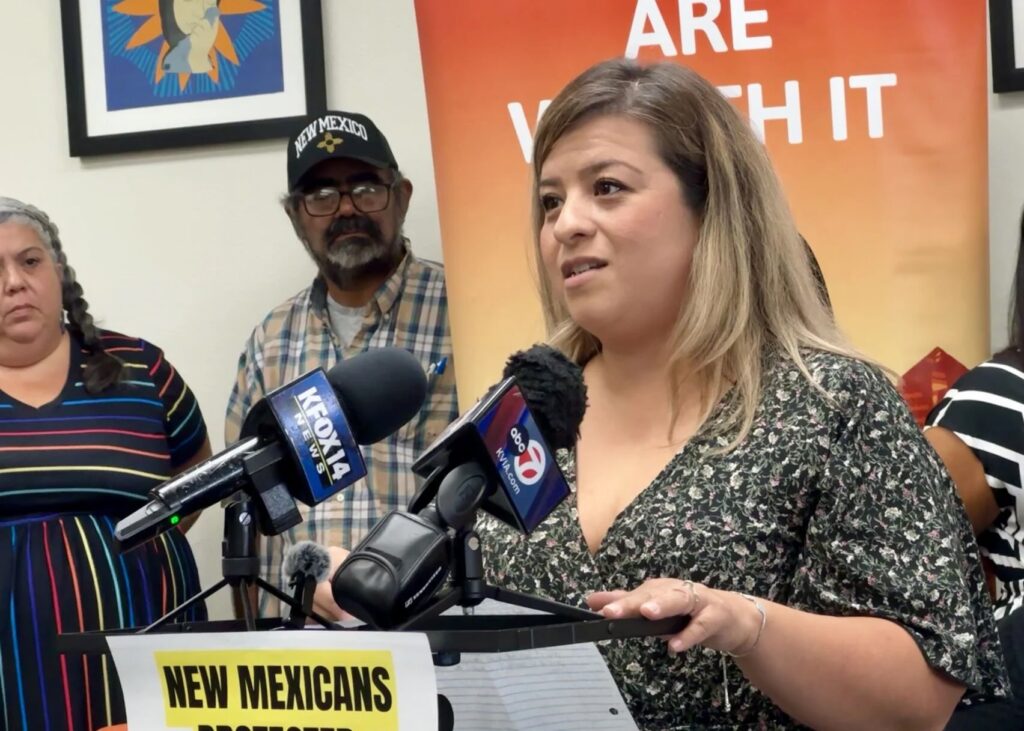
Woman who sued Las Cruces hospital promotes law protecting patients
August 20, 2025LAS CRUCES — Community organizations joined a woman who successfully sued a Las Cruces hospital over its debt collection practices Wednesday to promote a state law protecting low-income patients.
MountainView Regional Medical Center, a private for-profit hospital owned by Tennessee-based Community Health Systems Inc., took Ruby Kirker to court in 2022 seeking $6,205 for medical services related to her pregnancy.
With the assistance of the New Mexico Center on Law and Poverty, Kirker filed a class-action counterclaim alleging the lawsuit violated the state’s Patients’ Debt Collection Protection Act, which protects patients with incomes below 200% of the federal poverty level from litigation for medical debt.
The law requires hospitals to check patients’ incomes to see if they qualify for financial assistance and are legally protected against lawsuits, garnishments, property liens and sales of their debt to third-party collectors.
In addition to the hospital, the counterclaim named the law firm representing the hospital, Missouri-based Faber and Brand LLC, as a defendant.
Under a $399,375 settlement agreement reached in May, 277 patients, including Kirker, will receive damages of $625, with some patients entitled to refunds for payments they had made from a $200,000 refund pool.
“Our hospital is committed to following all laws and regulations, including the Patient Debt Collection Protection Act, and are pleased to have resolution in this matter,” MountainView said in a statement issued to the Journal. “We care deeply about our patients, and very consciously try to help patients manage their hospital bills and consider the unique circumstances of each individual’s situation.”
Faber and Brand did not respond to emailed queries and could not be reached by phone.
Sovereign Hager, the Center on Law and Poverty’s legal director, said at a news conference that the settlement required the hospital and third-party collectors to change their practices to comply with state law.
“We want families and hospitals and medical facilities to know the law, and families to know their rights,” Hager told reporters. “The law is meaningful and it protects people. … Families may be facing more medical debt and it’s really important for families to know those protections exist and for hospitals to know how they are enforced.”
The hospital stated that “staff members are available to help patients understand their financial responsibility and support available to resolve their bills, such as charity care, discounts, and flexible payment plans,” and that it also works with patients to enroll in programs such as Medicaid.
The hospital also said its financial assistance programs “provide free care to uninsured individuals making less than 200% of (federal poverty level) and significant discounts for uninsured individuals whose income is between 200% and 400% of FPL. … In 2024, our hospital provided approximately $48.4 million in charity and uncompensated care — medical care that was provided and not paid for.”
Juliana Hernandez, an organizer with Strong Families New Mexico, called the settlement a “step forward” as residents face a changing landscape following major federal cuts to health spending.
“More and more barriers are being put in place that are surely going to result in more people running to (emergency rooms) rather than preventative care,” she said. “Medical debt is about to rise statewide due to cuts to Medicaid and affordable health care options.”
State officials have estimated 90,000 New Mexicans could lose Medicaid coverage entirely, while 250,000 could face new copays and new conditions for enrollment due to changes enacted under the reconciliation package known as “One Big Beautiful Bill.”
New Mexico leads the U.S. in Medicaid enrollment, with approximately 810,000 of the state’s residents enrolled during July.
In an interview, Kirker said the cuts might have harsher consequences for residents, including members of her own family, who avoid professional medical care because of the potential expense.
“It’s thinking that you’re going to go the hospital and get turned around, not taken care of, and I hope this brings light to that,” she said. “I just hope that they know they’re protected.”
Originally published in Albuquerque Journal